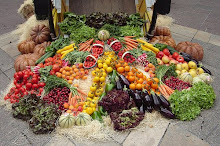Having written up Part 1 to these posts regarding artificial sweeteners, I can only hope you have concluded (or at least thought about the issues) that these aren't worth risking your health over. But if these artificial sweeteners (hereinafter referred to simply as "A.S.") are as bad as they seem, then why on earth do they continue to be manufactured and sold? And more importantly, why do we - the general population - continue to buy them?
There is a multiplicity of issues and reasons as to why these happen, but stick with me, and I'll attempt to list what I believe are the main reasons behind:
- Why companies continue to manufacture A.S.
- Why consumers (like yourself) continue to buy them.
Why Companies Use A.S.
We'll kickstart the discussion with this first premise, because intertwined with this is why companies also neglect to mention the dangers of A.S.
For starters, a case in point is Aspartame (951 or E951). Aspartame appears in just about anything that carries the words "diet" and/or "lite". Aspartame is commonly used as the prime sugar substitute, and is in fact up to 200 times sweeter than refined sugar. Aspartame is also relatively cheap to produce, and thus is an easy choice when it comes to using it as a sweetener.
Because it is cheap to produce, it is also a prime choice for companies who utilise A.S. in their products, because let's face it: manufacturing revolves around producing goods as best as possible, with as little cost as possible. It is how basic manufacturing companies survive, because you can produce a LOT of, say, diet soda, from a small sample of Aspartame (owing to its 200 times sweeter than sugar fact).
Unfortunately, the history and inception of Aspartame is a sticky issue at best. It is made stickier because of its supposed "approval" by the FDA, the American equivalent of the NZ Food Safety Authority. And even MORE unfortunate is this mindset: if the "superiors" label it as safe, then I guess it IS safe. Nothing could be further from the truth!
The checkered history of Aspartame can be examined by looking at the relationship between the FDA and Monsanto, the company that created Aspartame. Consider the following:
"Of the 90 non-industry-sponsored studies, 83 (92%) identified one or more problems with aspartame. Of the 7 studies which did not find a problems, 6 of those studies were conducted by the FDA. Given that a number of FDA officials went to work for the aspartame industry immediately following approval (including the former FDA Commissioner), many consider these studies to be equivalent to industry-sponsored research.
"Of the 74 aspartame industry-sponsored studies, all 74 (100%) claimed that no problems were found with aspartame. This is reminiscent of tobacco industry research where it is primarily the tobacco research which never finds problems with the product, but nearly all of the independent studies do find problems."[1]
I would hazard a guess and say that most kiwis don't know about the above. We generally don't know because such reports are shielded from the public gaze. In short, if the public knew what A.S. could do to the human body, most companies whose incomes rely on the manufacture and sale of A.S. would crumble. So, under the protection of the FDA, the real truth is suppressed. And we, the unsuspecting public, continue to poison ourselves.
Aspartame, sadly, is big business in the diet industry, and because A.S. products continue to sell, companies continue to manufacture. This leads onto the second bullet point.
Why Consumers Continue To Buy
When people decide to go on a diet, generally the first thing to go is sugar consumption. And naturally, people then ask themselves what to have as a sugar substitute. And A.S. are the first and last port of call for overwhelming numbers of dieters. Why do people do this? Let's explore that very theme.
One such mindset in the general populace is that anything is good in moderation. In other words, if I have too much of a given food or drink, then I'm in danger. But if I have only enough without going over the boundaries, then I am safe. There are a number of problems with this reasoning, as you will soon see.
Consider this case in point. Consider a university student, who wants to graduate with an undergraduate degree (say, a BA). But he doesn't want to do too much study, because he still wants to maintain something of a "life". So the students, under the maxim of "C's get degrees", does just enough work in order to pass his chosen courses, with the barest, minimum pass possible.
Now, no student worth their salt would believe that (I hope they don't, anyways). A student serious about passing their courses and graduating with a BA or whatever choice of study, will do whatever it takes to clinch the best possible pass they can get! For me, I'd love to grab myself an A+ in any of my courses, but even if I don't get an A+, must that mean I stop trying my absolute best? Of course not!
In a roundabout way, most dieters operate under the "C's get degrees" mindset. A dieter will generally do just enough in order to stay under a certain weight, to consume just enough calories without going over the limit.
There is another problem however. Suppose a dieter DOES go the extra mile and stays well under the limit for a given thing. This is definitely a good thing, but the problem then comes with what I like to call the "Bankers Mentality". In other words, if somebody wants to lose 5kg but instead loses 10kg, that person would think that the extra 5kg loss somehow entitles them to celebrate by pigging out on the very foods they were cutting out. In other words, the person made a hefty deposit, and therefore believes they are entitled to a hefty withdrawal from the bank account of dieting.
This is an unfortunate and unhealthy mindset to have when dieting or striving for better health, because it actually promotes unhealthy habits. Think about it: if someone strove to shed more weight than necessary because it gave them the obligatory right to a custard square or a cream bun, then that would actually undo all that healthy activity and dieting. It would be like a dieter going for a 5km run, only to come home and eat a couple of chocolate bars. Those choc bars would undo all that hard slog.
I believe that, for dieting to be a true success, we must shed from our minds this compulsion to eat or drink whatever we like, owing to going the extra mile. If you are someone who goes the extra mile in dieting, PLEASE DON'T UNDO YOUR HARD WORK! Ask yourself this: after a days dieting, do you REALLY think it is compulsory to eat that cream bun? Or drink that sugary substance?
if you really feel you require some sort of reward, there is NOTHING wrong with good ol' water! A reward doesn't have to have a sweet taste or fancy colours in order to qualify as a reward object. If you believe you need a biscuit, why not slice up some fruit and eat that instead? I'll say it again: YOU DON'T HAVE TO HAVE A NON-DIET FOOD. You only want to have that non-diet food. Can you see the difference?
A Third Alternative
At this point, people may be thinking they only have two choices available to them: Sugar or A.S. The answer is that that isn't the case. There is always more than one choice. For example, if you had to decide between Coke and Coke Zero, choose Water. There is absolutely nothing wrong with water. Nobody chooses water because nobody wants to.
But seriously, between sugar and A.S. there is in fact another alternative, one that manufacturers don't want you to know about. It is an alternative that the FDA blacklisted for many years, because it posed (and still poses) a challenge to artificial sweeteners. This alternative is also 200 times sweeter than sugar when in powder form (around 30 times when in herb form), AND IS NOT MADE FROM ARTIFICIAL CHEMICALS! This alternative is 100% natural, and also contains some healthy benefits when consumed.
I'm talking about a product called Stevia. Ever heard of it?
Consider this: Japan is a country that enjoys some of the longest life spans in the developed world. Japan is also a country that uses Stevia in nearly everything that requires a sugar substitute. Does this sound like a coincidence? I for one am inclined to think it is not.
Conversly, most countries in the western world, although affluent, experience higher rates of depression and cognitive and degenerative disease (your America's, Europe's, etc). These same countries are also leading producers and consumers of artificial sweeteners. I'll leave you to do the math on that one.
Believe me, if you want a healthy sugar substitute, and you feel that you need to have some kind of sweet stuff in your diet, then Stevia is by far your best choice. If you have never heard of it before, do not be surprised. For decades, A.S. have been promoted (dubiously) by food and drug authorities, over and against all the other, healthier alternatives. If this is the first time you have ever heard of Stevia, it is mainly because A.S. companies don't want you to know about it. Stevia would cut into their sales, providing a formidable competitor for your diet dollars. But because of the cloak-and-dagger methods employed by the FDA in its history, A.S. have become entrenched in the public consciousness, and A.S. companies would like it to remain that way.
Of course, weight loss companies that promote the use of foods and drinks that contain A.S. are unlikely to speak out against their use, because the weight loss programs are more or less controlled by the sales of these goods, and thus to speak out against the use of A.S. would cut into their own finances. Most companies are unlikely to slit their own throats, so in order to continue making the money, they continue selling the products, irrespective of the damage they cause.
On the other hand, weight loss companies are distributing A.S. goods, probably unaware of the damage they actually cause. Hence the need for independent people to sit down and dig deep in order to find out about A.S., and thus raise the public awareness. This is the reason blogs like mine exist.
Oh, and if you don't believe me re anything about A.S., then allow me to present to you a challenge. Cut out of your diet completely anything that contains an artificial sweetener. Try it for a month. Hell, try it for two months, replacing it with stuff like fruit, veges and water. Like I said, there is nothing wrong with the basics of fruit and water, but for most people, simply eating fruit and drinking water is boring. Tell me, when did the state of your health become dictated by what was exciting?
Sure, for most, it may be boring...but it sure is good!
The challenge has been laid out. Who will accept?
Notes:
[1] http://www.holisticmed.com/aspartame/100.html (August 14, 2009 - emphasis added)



